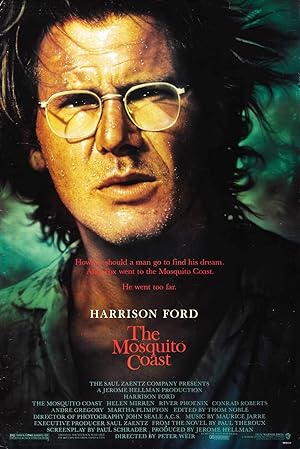The Mosquito Coast
| 1986Directed by: Peter Weir
Main Plot
The Mosquito Coast follows the journey of an idealistic inventor named Allie Fox, who becomes disillusioned with modern American society and its consumerism. Seeking a simpler, more meaningful life, he uproots his family and embarks on a daring adventure to the jungles of Central America. Allie dreams of creating a utopian community where they can live off the land and escape the perceived corruption of civilization. As they navigate the challenges of the harsh environment, the family faces both external threats and internal conflicts, testing their bonds and beliefs. Allie's vision becomes increasingly obsessive, leading to a series of dramatic events that force each family member to confront the reality of their situation and the consequences of their father's radical choices. The film explores themes of idealism, family dynamics, and the clash between civilization and nature.
Characters
- Harrison Ford plays Allie Fox, an inventor who moves his family to Central America, seeking to create a utopian society away from modern civilization.
- Helen Mirren plays Margot, the supportive wife of inventor Allie Fox, as they embark on a perilous journey to create a utopian society in the jungle.
- River Phoenix played Charlie Fox, the son of an inventor who moves his family to the jungle, witnessing his father's obsession and its consequences.
Ending Explained
In the ending of The Mosquito Coast, the tension reaches its peak as Allie Fox's vision of a utopian life in the jungle unravels. After a series of increasingly dangerous decisions, his family becomes disillusioned with his radical ideals. The climax occurs when Allie’s attempts to create a self-sufficient paradise lead to chaos, culminating in a confrontation with local authorities and the realization that his dream has turned into a nightmare. As the family faces the consequences of Allie's actions, they are forced to confront the reality of their situation. The pivotal moment comes when they must decide whether to continue following Allie or to seek their own path to safety. In a desperate bid for freedom, they attempt to escape the jungle, symbolizing a break from Allie's oppressive vision. The film concludes with a sense of ambiguity, as the family’s future remains uncertain. The ending highlights the central themes of idealism versus reality and the dangers of fanaticism, ultimately suggesting that the pursuit of an unattainable dream can lead to destruction. The resolution of the main conflict lies in the family's choice to reclaim their autonomy, moving away from Allie's control and the chaos he created.
